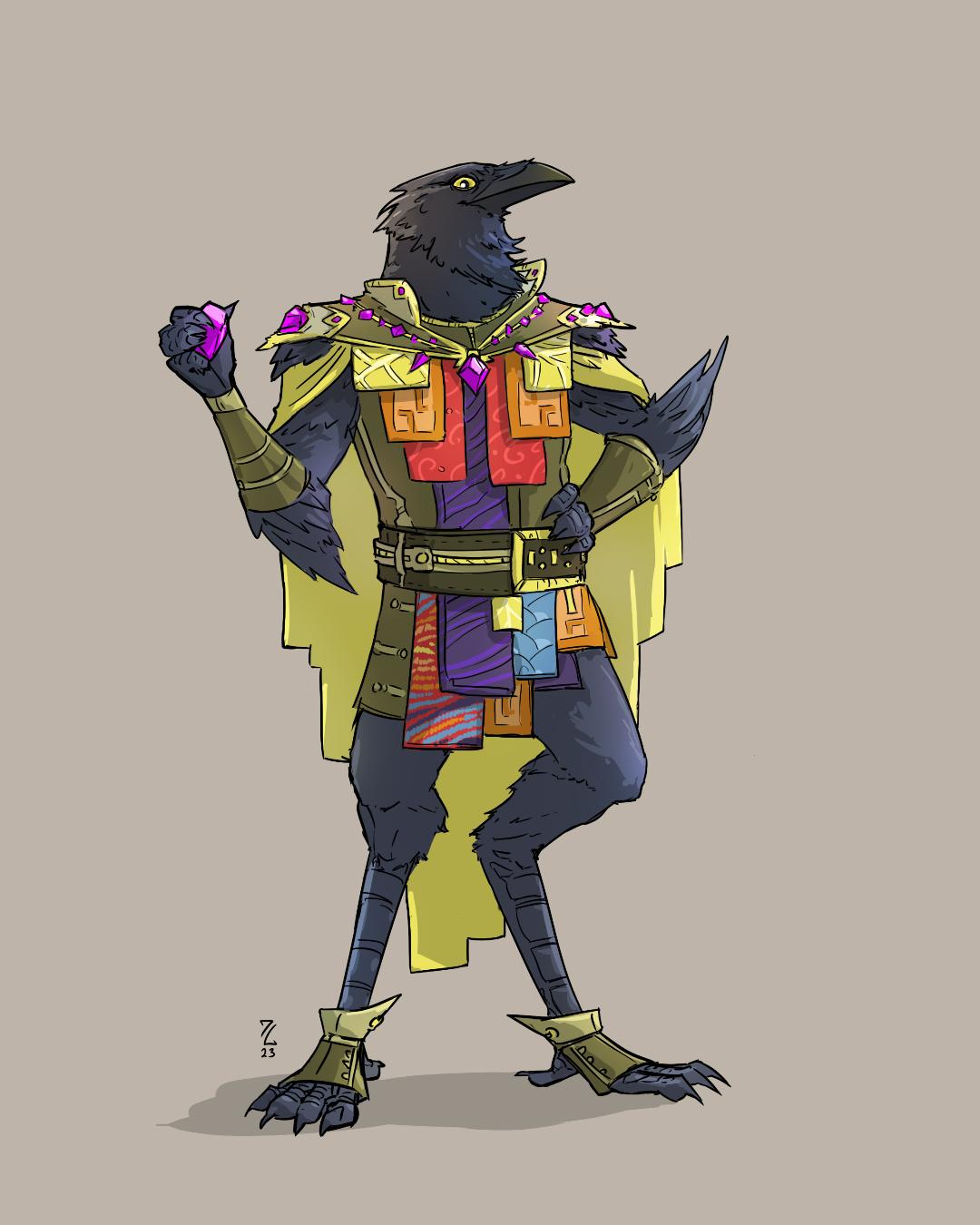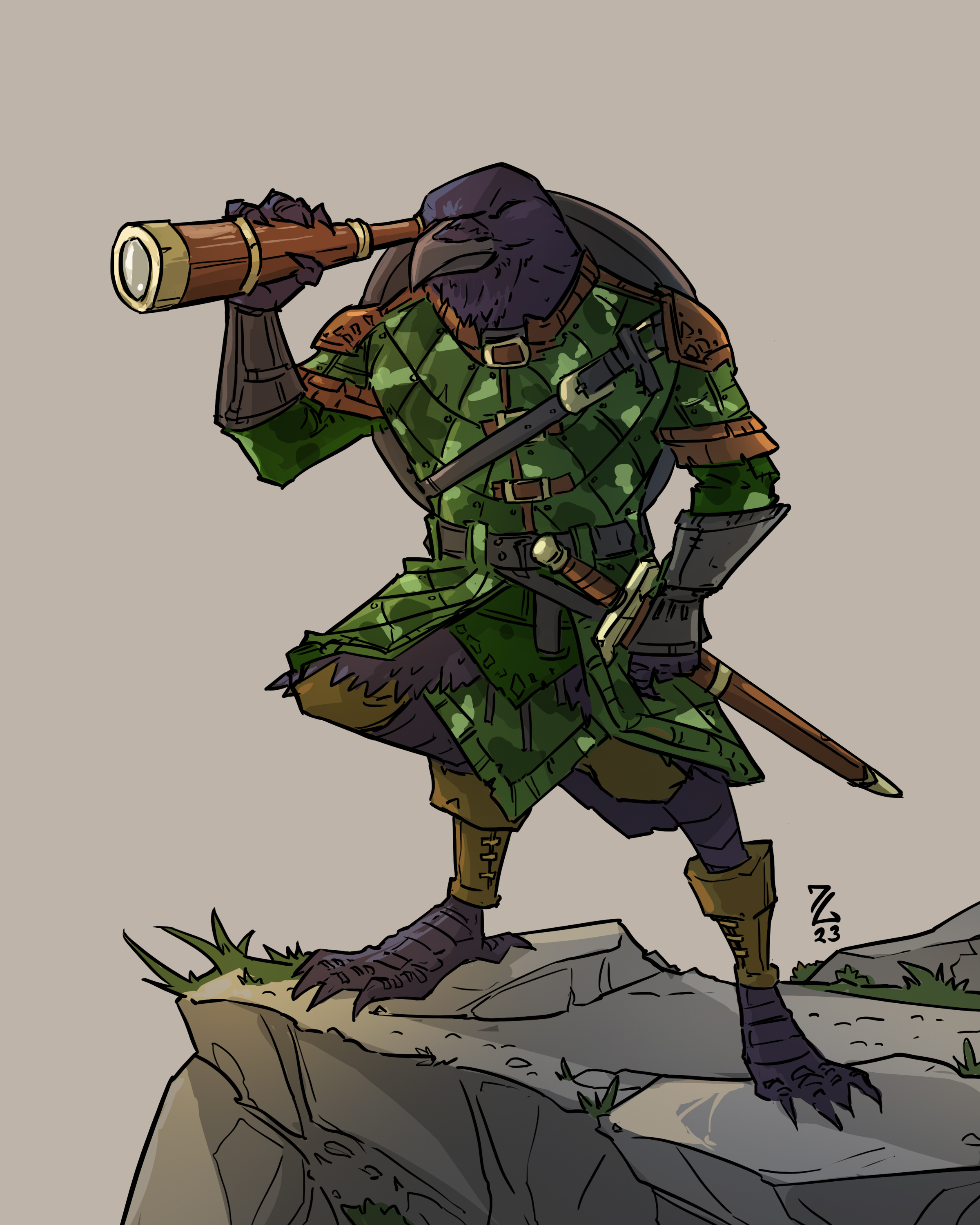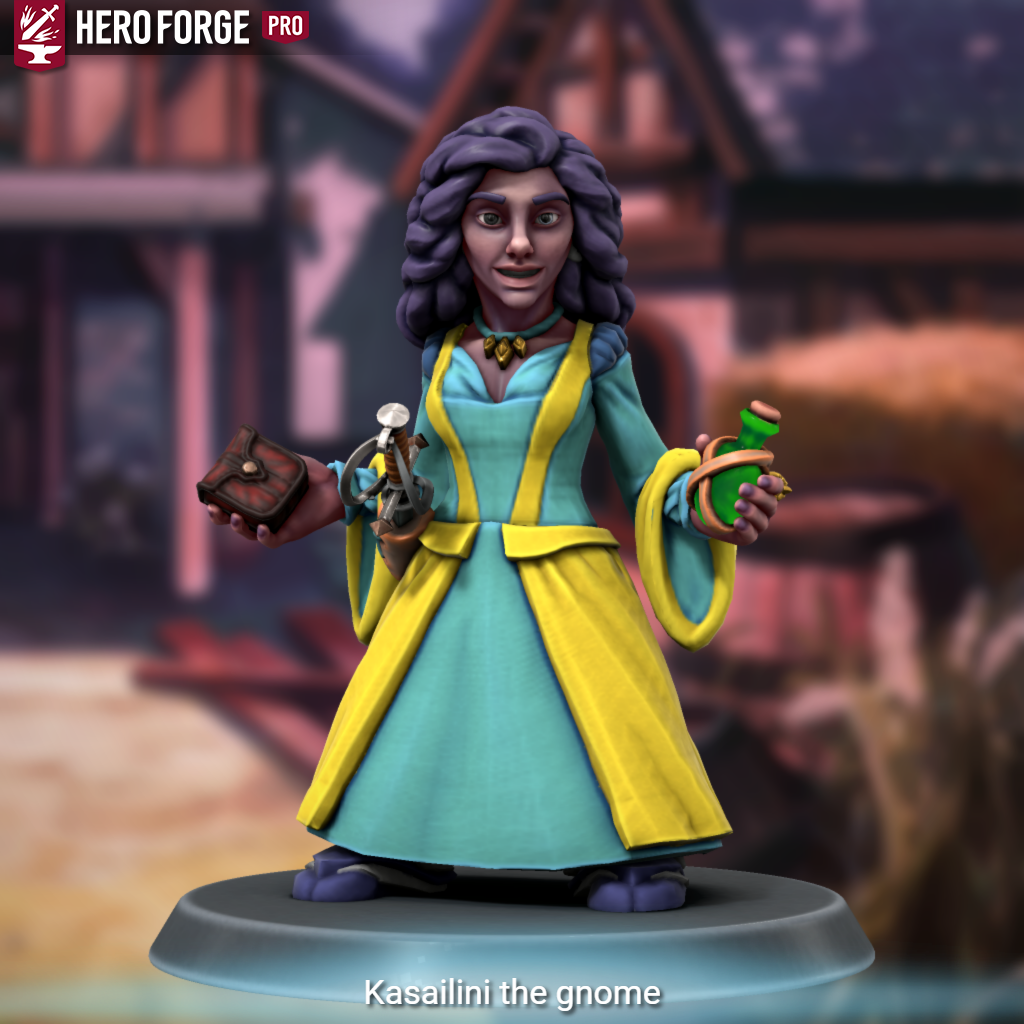So you want to play a Rogue/Expert?
In this case I'm lumping together classic D&D rogues with bards, scouts, cloistered clerics, and rangers. Basically any character with lots of skills, somewhat at the expense of fighting and/or magical ability is part of the "expert" character archetype. An expert that has a lot of clandestine skills is part of the "rogue" archetype.
 The most learned men and women in Scarterra likely read a lot of books and they listened to a lot of oral lore from salt of the earth types.
"Where and from whom did your character get his/her education" is a character every player should ask, but this is especially important if you want to play an expert.
All characters should consider Merits and Flaws carefully and keep in mind that social Merits and Flaws have more story hooks. Experts and rogues should have even more social Merits and Flaws than most other characters. They have to have learned their knowledge from somewhere. Some social Merits can represent teachers and information sources. Anyone who is a more roguish expert might have made some enemies as well as allies with their criminal dealings.
The most learned men and women in Scarterra likely read a lot of books and they listened to a lot of oral lore from salt of the earth types.
"Where and from whom did your character get his/her education" is a character every player should ask, but this is especially important if you want to play an expert.
All characters should consider Merits and Flaws carefully and keep in mind that social Merits and Flaws have more story hooks. Experts and rogues should have even more social Merits and Flaws than most other characters. They have to have learned their knowledge from somewhere. Some social Merits can represent teachers and information sources. Anyone who is a more roguish expert might have made some enemies as well as allies with their criminal dealings.
 Specializations are cheap at only one experience point for your first one in any ability. It is wise to load up on specializations for your brainy character once you figure out what specific subjects are most relevant to your character or the campaign you are in.
Any expert character should carefully consider all the advanced skills. You probably want to take one or two of them at least. Any adventuring party benefits from at least one character with a couple dots in Arcana because the protagonists in a fantasy adventure are going to step into something weird. "Monster lore" is a good Arcana specialization for most globetrotting adventures, but "Scarnoctis lore" is a good specialization if you are playing a deep diving dwarf ranger.
Spirit loas are probably worthy of their own "So you want to play a ______" article and you should not play a spirit loa purely for the mechanical benefits if you are not interested in the roleplaying angle that being a living conduit for dead people. That said. From a purely min-max perspective, Spirit Loa RPG rules synergize very well with expert characters and is it lets you occasionally pull obscure lore out of your metaphorical ass if the story throws a curveball at you.
All expert characters benefit from a high Intelligence score. Thieves and assassins benefit from high Dexterity and Wits ratings. Scout and sentinel types benefit from high Perception scores. Con artist types and bard inspired socialites probably should probably load up on all three social attributes. If you want to play an Expert that crosses into all these categories, your freebie points are going to be spread pretty thin, but you can fill out the gaps with experience later, if your character survives.
D&D 3rd ed "Sense Motive" or 5th ed "Insight" is, usually covered by Perception + Empathy.
Keeping your story straight under lengthy interrogation requires Manipulation + Subterfuge.
Maintaining a good poker face requires Wits + Subterfuge.
Escape Artist is pretty self explanatory, it is usually paired with Dexterity. Lip reading is also self explanatory, it is usually paired with Perception.
Sneaking around usually involves Dexterity + Stealth, occasionally Wits + Stealth. Setting up an ambush where you think the enemy is coming usually involves Intelligence + Stealth. If you want to sneak around in the wilderness, you cannot roll more dice in Stealth than you have dice in Survival.
If you want to sneak around in the wilderness, you need Survival to keep pace with your Stealth score. As long as you are playing an expert with a high Survival rating, you might as well pick up Animal Ken and Hearth Wisdom to become a true wilderness expert.
Camouflage usually takes Manipulation + Survival. Non-magical disguises usually involve Manipulation + Subterfuge.
Impersonating someone usually relies on Charisma + Performance or Manipulation + Subterfuge to maintain cover. Ad-libbing answers to maintain your façade under unanticipated circumstances typically involves Wits + Performance or Wits + Subterfuge rolls. Under certain circumstances you might use something else other than Subterfuge or Performace such as rolling Manipulation + Theology to impersonate a priest.
Poison use (and antidotes) are usually part of Hearth Wisdom, but for the exotic stuff, Alchemy is used. More often than not, Intelligence is the base attribute.
If you want your character to be good at picking locks and dismantling traps, you should the advanced skill Disable Device. The base attribute is usually Dexterity or Intelligence depending on the nature of the thing you are disabling.
Perception + Alertness covers noticing things. This is useful for hearing the goblin trying to sneak up on you or noticing that the scary monster has a thorn in it's foot or noticing that one small section of a dungeon wall has noticeably less dust on it than the surrounding dungeon wall. Perception + Alertness is a very useful dice pool to optimize for any adventurer, not just a D&Desque rogue.
Perception + Investigation covers physically looking for things and Charisma or Manipulation + Investigation covers searching for things by asking people questions.
Lying to people and getting away with it is usually Wits/Manipulation/Charisma + Subterfuge with attribute depending on the sort of con you are pulling.
If you are not actively lying, but you still want to get people to do things for you, a socially oriented rogue or expert should consider putting a couple dots into Etiquette and Expression to move among both upper class and lower class society without overtly tricking people. Politics, Intimidation, and Performance are situationally useful too depending on why your rogue is trying to be social.
Commerce is useful for getting a good deal on any negotiations involving monetary transactions. Most haggling rolls opposed Manipulation + Commerce. Most appraisals roll Intelligence + Commerce, but if you don't have time to take everything and need to cherry pick the best loot to snatch before bolting, Perception + Commerce is what you will usually roll.
It is advisable that but you not neglect these things entirely. It is a good idea to consider taking a few dots of melee and the shield proficiency advanced training Merit just to make sure you aren't the weak link in your adventuring party during a fight. One nice thing about experts, is that most of the tricks in your arsenal are technically not attacks so you can use your B action to perform a rogue trick and use your A action to parry or dodge any enemies that happen to be targeting you.
An expert character can try to squeeze in a bit of divine or arcane magic, but not too much. if you want to be an expert character with a bit of magic on the side, you probably cannot afford to load up on a crazy amount of magic. You'll want to very carefully pick a few magical tricks that will synergize well with your mundane abilities or shore up your character's shortcomings.
Specializations are cheap at only one experience point for your first one in any ability. It is wise to load up on specializations for your brainy character once you figure out what specific subjects are most relevant to your character or the campaign you are in.
Any expert character should carefully consider all the advanced skills. You probably want to take one or two of them at least. Any adventuring party benefits from at least one character with a couple dots in Arcana because the protagonists in a fantasy adventure are going to step into something weird. "Monster lore" is a good Arcana specialization for most globetrotting adventures, but "Scarnoctis lore" is a good specialization if you are playing a deep diving dwarf ranger.
Spirit loas are probably worthy of their own "So you want to play a ______" article and you should not play a spirit loa purely for the mechanical benefits if you are not interested in the roleplaying angle that being a living conduit for dead people. That said. From a purely min-max perspective, Spirit Loa RPG rules synergize very well with expert characters and is it lets you occasionally pull obscure lore out of your metaphorical ass if the story throws a curveball at you.
All expert characters benefit from a high Intelligence score. Thieves and assassins benefit from high Dexterity and Wits ratings. Scout and sentinel types benefit from high Perception scores. Con artist types and bard inspired socialites probably should probably load up on all three social attributes. If you want to play an Expert that crosses into all these categories, your freebie points are going to be spread pretty thin, but you can fill out the gaps with experience later, if your character survives.
D&D 3rd ed "Sense Motive" or 5th ed "Insight" is, usually covered by Perception + Empathy.
Keeping your story straight under lengthy interrogation requires Manipulation + Subterfuge.
Maintaining a good poker face requires Wits + Subterfuge.
Escape Artist is pretty self explanatory, it is usually paired with Dexterity. Lip reading is also self explanatory, it is usually paired with Perception.
Sneaking around usually involves Dexterity + Stealth, occasionally Wits + Stealth. Setting up an ambush where you think the enemy is coming usually involves Intelligence + Stealth. If you want to sneak around in the wilderness, you cannot roll more dice in Stealth than you have dice in Survival.
If you want to sneak around in the wilderness, you need Survival to keep pace with your Stealth score. As long as you are playing an expert with a high Survival rating, you might as well pick up Animal Ken and Hearth Wisdom to become a true wilderness expert.
Camouflage usually takes Manipulation + Survival. Non-magical disguises usually involve Manipulation + Subterfuge.
Impersonating someone usually relies on Charisma + Performance or Manipulation + Subterfuge to maintain cover. Ad-libbing answers to maintain your façade under unanticipated circumstances typically involves Wits + Performance or Wits + Subterfuge rolls. Under certain circumstances you might use something else other than Subterfuge or Performace such as rolling Manipulation + Theology to impersonate a priest.
Poison use (and antidotes) are usually part of Hearth Wisdom, but for the exotic stuff, Alchemy is used. More often than not, Intelligence is the base attribute.
If you want your character to be good at picking locks and dismantling traps, you should the advanced skill Disable Device. The base attribute is usually Dexterity or Intelligence depending on the nature of the thing you are disabling.
Perception + Alertness covers noticing things. This is useful for hearing the goblin trying to sneak up on you or noticing that the scary monster has a thorn in it's foot or noticing that one small section of a dungeon wall has noticeably less dust on it than the surrounding dungeon wall. Perception + Alertness is a very useful dice pool to optimize for any adventurer, not just a D&Desque rogue.
Perception + Investigation covers physically looking for things and Charisma or Manipulation + Investigation covers searching for things by asking people questions.
Lying to people and getting away with it is usually Wits/Manipulation/Charisma + Subterfuge with attribute depending on the sort of con you are pulling.
If you are not actively lying, but you still want to get people to do things for you, a socially oriented rogue or expert should consider putting a couple dots into Etiquette and Expression to move among both upper class and lower class society without overtly tricking people. Politics, Intimidation, and Performance are situationally useful too depending on why your rogue is trying to be social.
Commerce is useful for getting a good deal on any negotiations involving monetary transactions. Most haggling rolls opposed Manipulation + Commerce. Most appraisals roll Intelligence + Commerce, but if you don't have time to take everything and need to cherry pick the best loot to snatch before bolting, Perception + Commerce is what you will usually roll.
It is advisable that but you not neglect these things entirely. It is a good idea to consider taking a few dots of melee and the shield proficiency advanced training Merit just to make sure you aren't the weak link in your adventuring party during a fight. One nice thing about experts, is that most of the tricks in your arsenal are technically not attacks so you can use your B action to perform a rogue trick and use your A action to parry or dodge any enemies that happen to be targeting you.
An expert character can try to squeeze in a bit of divine or arcane magic, but not too much. if you want to be an expert character with a bit of magic on the side, you probably cannot afford to load up on a crazy amount of magic. You'll want to very carefully pick a few magical tricks that will synergize well with your mundane abilities or shore up your character's shortcomings.
Background Basics
Brainy characters in Scarterra might be formally educated, either because they were born to rich parents who could afford learned tutors or they had a lengthy monastic education (whether or not they walked away from their education with magical ability).
It's not necessary for a brainy character to be a scroll head. Traveling minstrels and storytellers have a lot of oral lore and most rural villages and barbarian tribes honor their wise men and women. Most village elders and traveling minstrels love to hear themselves talk, so any young person with a good attention span can learn a lot of interesting things without ever opening a book.
If you want your character to have advance thievery skills, she probably didn't learn this lore from a book, but the best thieves are usually at least somewhat literate because stolen letters and missives are often more valuable than stolen coins and trinkets.

Tengku #5 by Zeta Gardner
On the subject dungeon crawling characters
Does Scarterra have several dungeons in it? Yes. Does Scarterra have as many dungeons as many dungeons in it as most D&D published settings? Not even close. Scarnoctis is the settings equivalent to Forgotten Realm's Underdark. Technically the entire realm is a technically a dungeon but the realm doesn't play like a 2nd, 3rd, or 5th edition D&D dungeon, at least not everywhere. It is also worth noting that the handsome and brilliant fantasy world creator who created hundreds of thousands of words for Scarterra and Scaraqua has barely begun developing Scarnoctis in detail. If you character's concept and build is based entirely around exploring dungeons, you as a player will probably be disappointed. There will be some dungeons (especially if you ask for dungeons during Session Zero), but dungeon crawls will not be the foundational bedrock of any long-term campaign, dungeons are a sometime food. But if you want to play a character that is good at navigating labyrinthine underground caverns and avoiding traps and hazards, just let your game master know so he can plan ahead and make sure that you have trap filled labrynths to navigate.Wilderness Savvy Expert Characters

Tengku #7 camo version by Zeta Gardner
An Expert character is a character that succeeds or fails based on what he or she knows. This doesn't have to be a purse snatching urban thief or a cloistered academic surrounded by dusty scrolls. The fantasy archetype of a ranger is a subtype of Expert.
Scarterra certainly has lots of wild and untamed places and a wilderness savvy expert can be a powerful asset to most adventuring parties. There is also no reason you cannot make an expert character with one foot in civilization and one foot in the wilderness.
The Scarterran wilderness is a rough place, so most wilderness experts should consider taking a dash of the warrior traits.
Power optimization of your points buys
Any character who drops three or four dots into a single ability can be an expert in that one thing, even if their mental attributes are underwhelming. Most players who put any thought at all into their background probably wants their character to be an expert in at least one thing, even if they aren't aiming for the expert archetype.If your entire character's concept is based on being an expert, than you want us as high of an Intelligence score as you can justify.
A character with Intelligence ●● and Theology ●●●● knows just as much obscure lore about religious groups and spiritual metaphysics as someone with Intelligence ●●●● and Theology ●●. This means a character with a high base Intelligence score can easily be an expert on a wide variety of things with minimal expenditure of experience points or starting character ability/freebie points. Of course if you want to be freakishly knowledgeable about something, your character should have a high intelligence score and a high rating in the trait in the question. Than your character is probably your local nation's leading expert on this, if not Scarterra's leading expert.
Translating rogue actions into dice pools
If you want to play a D&D style rogue/thief, here are the guidelines for doing thiefy things in Scarterra d10.
Picking pockets and drawing concealed weapons, is usually Dexterity + Legerdemain, sometimes Wits or Manipulation + Legerdemain if you are relying heavily on onlookers being distracted.
Any character can gain an attack bonus attacking unprepared or unaware targets. Characters with the "Sneak Attack!" Advanced Training Merit get bonus damage when making cheap shots like this. A staple for rogue characters, this is also good for warriors who are too pragmatic to care about "honorable combat".
Appearance is rolled less often than most other attributes but it is used for first impressions and most rogue types rely on first impressions for their cons and then hope they never run into the people they tricked a second time. If your rogue character is primarily a talker, a high Appearance score is very useful. If your rogue character is primarily a skulking assassin or sneak thief, a high Appearance might be a liability because it makes your character more noticeable and memorable to witnesses and makes your character stand out in a crowd.
After all this, you probably want your character to spread a lot of dots around a lot of things. This means you are going to have less points to spend on magic and fighting abilities.





Comments